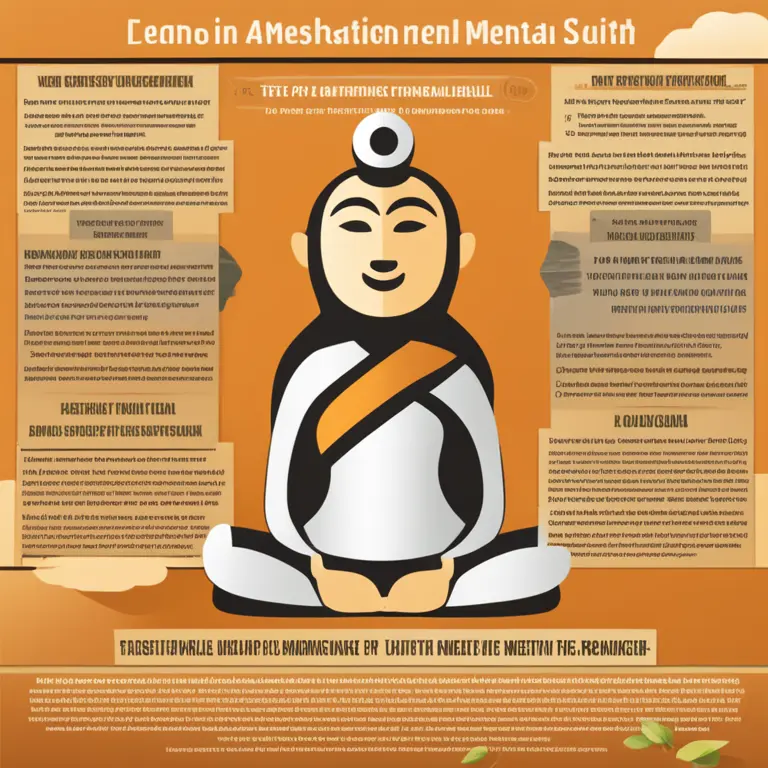
The Harmony of Meditation and Mental Well-being
Discover the profound impact of meditation on mental well-being, exploring its benefits as a holistic approach to a healthier mind.
article by Hina Kurosawa
Meditation: A Gateway to Mental Equilibrium
Meditation has long been practiced as a technique for fostering tranquility and balance. Its rise in popularity has heralded it as a cornerstone for mental health maintenance. In the contemporary context, meditation is lauded for its ability to reduce stress, mitigate anxiety, and promote emotional health. The serene act of meditating can transcend mere relaxation, becoming a daily ritual that underpins a sound mental state. Scientific studies have cemented meditation’s reputation, showing tangible effects on the brain's functionality. These include enhancing focus, bolstering memory retention, and fostering a sense of inner peace that combats the chaos of modern life.

Integrating Meditation into Lifestyle
The integration of meditation into one's lifestyle speaks to a broader cultural shift towards wellness and mindfulness. Its versatility is evident, from mindfulness-based stress reduction programs to the incorporation of meditative practices in psychotherapy. Major health authorities recognize its value, with mental health professionals prescribing meditation as a complementary practice to standard treatments. It is an accessible practice, requiring no specialized equipment, and it is easily adapted to personal preferences, whether one finds peace in guided sessions, silent introspection, or movement-based methods like yoga.

Meditive Practices: Shaping Mental Resilience
Meditation shapes mental resilience, empowering individuals to navigate life’s vicissitudes with greater ease. It builds warriors of wellness, equipped to handle stressors with a calm demeanor and a clear mind. The most poignant benefit is perhaps its capacity to recalibrate our response to stress. By cultivating a meditative mindset, we initiate a shift from reactive to proactive mental health management. This resilience extends to emotional regulation as well, allowing for a more measured response to emotional turbulence and fostering improved relationships with ourselves and others.
Neuroscientific Backing and Technological Advancements
Cutting-edge neuroscientific research in 2024 has illuminated the profound effects meditation has on the brain's structure. Innovations in brain imaging reveal that consistent meditative practice can lead to increased gray matter density, especially in regions associated with self-awareness and empathy. Technological advancements have also played a crucial role in promulgating meditation. A multitude of mindfulness apps provide personalized sessions, catering to the unique needs of a global audience, making meditation more accessible and trackable, allowing individuals to witness their progress and remain motivated.
The Digital Age and Accessibility of Mindfulness
The digital age has revolutionized access to mindfulness resources. Where once knowledge of meditation techniques was confined to specific cultural or spiritual contexts, it is now available globally, transcending boundaries and uniting users in the quest for mental clarity. Online communities and virtual classes offer support and encouragement, making the practice less isolating and more interconnected. This sense of community is vital, particularly as we grapple with the mental health ramifications of an increasingly online world rife with stimuli that can disrupt our inner peace.
Meditation Tailored to Individual Needs
The personalization of meditation is a hallmark of its widespread appeal. In 2024, there is a growing trend towards tailoring meditation to fit individual lifestyle choices and psychological profiles. This has given rise to specialized meditation streams, paralleling the rise in personalized medicine. Recognizing that one size does not fit all, the field adapts to each person's unique circumstances, such as time constraints, emotional challenges, and preferred learning methods. This customization enhances the efficacy of meditation, leading to greater satisfaction and long-term adherence to the practice.
Published: 1/15/2024
Modified: 1/15/2024
More predictions
Come back here soon to learn more about yourself and your future


Mindfulness & Meditation: A Guide for High Schoolers
Discover the benefits of mindfulness meditation tailored for the hectic life of high school students, and learn simple strategies to incorporate it into the daily routine.


Mindfulness Meditation: A Handbook for High Schoolers
Discover how mindfulness meditation can benefit high school students, enhancing focus, reducing stress, and promoting overall well-being.


Easing Loneliness with Meditation
Discover how mindfulness meditation can provide solace and connection to mitigate feelings of loneliness, enhancing emotional and mental well-being.